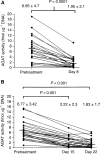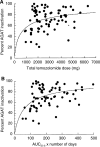Marked inactivation of O6-alkylguanine-DNA alkyltransferase activity with protracted temozolomide schedules
- PMID: 12671695
- PMCID: PMC2376384
- DOI: 10.1038/sj.bjc.6600827
Marked inactivation of O6-alkylguanine-DNA alkyltransferase activity with protracted temozolomide schedules
Abstract
Temozolomide, an oral DNA methylator that inactivates the DNA repair enzyme O(6)-alkylguanine-DNA alkyltransferase (AGAT), has demonstrated anticancer activity on protracted schedules. Protracted schedules may lead to an 'autoenhancement' of temozolomide's inherent cytotoxic potential by cumulative reduction of the cell's capacity for AGAT-mediated DNA repair and resistance. This study was undertaken to characterise AGAT inactivation and regeneration in the peripheral blood mononuclear cells (PBMCs) of patients treated on two protracted temozolomide schedules. O(6)-alkyl guanine-DNA alkyltransferase activity was measured in the PBMCs of patients treated on two phase I protracted temozolomide studies. Patients were treated daily for either 7 days every 2 weeks (Schedule A) or 21 days every 4 weeks (Schedule B). The effects of various temozolomide doses (75-175 mg m(-2)), treatment duration (7-21 days), and temozolomide plasma levels on AGAT inactivation and regeneration, as well as the relation between AGAT inactivation and toxicity, were studied. O(6)-alkyl guanine-DNA alkyltransferase activity in PBMCs was measured serially in 52 patients. Marked inactivation of AGAT occurred following 7 days of temozolomide treatment, with mean AGAT activity decreasing by 72% (P<0.0001). Similarly, mean AGAT activity decreased by 63 and 73% after 14 and 21 days of treatment, respectively (P<0.001 for both comparisons). O(6)-alkyl guanine-DNA alkyltransferase inactivation was greater after 7 days of treatment with higher doses of temozolomide than lower doses and remained markedly reduced 7 days post-treatment. However, AGAT inactivation following temozolomide treatment for 14 and 21 days was similar at all doses. On the continuous 21-day schedule, AGAT inactivation was significantly greater in patients who experienced severe thrombocytopenia than those who did not (90.3+/-5.5 vs 72.5+/-16.1%, P<0.045). In conclusion, protracted administration of temozolomide, even at relatively low daily doses, leads to significant and prolonged depletion of AGAT activity, which may enhance the antitumour activity of the agent.
Figures




References
-
- Bower M, Newlands ES, Bleehen NM, Brada M, Begent RJ, Calvert H, Colquhoun I, Lewis P, Brampton MH (1997) Multicentre CRC phase II trial of temozolomide in recurrent or progressive high-grade glioma. Cancer Chemother Pharmacol 40: 484–488 - PubMed
-
- Brock CS, Newlands ES, Wedge SR, Bower M, Evans H, Colquhoun I, Roddie M, Glaser M, Brampton MH, Rustin GJ (1998) Phase I trial of temozolomide using an extended continuous oral schedule. Cancer Res 58: 4363–4367 - PubMed
-
- Denis LJ, Tolcher A, Figueroa JA, Drengler R, Geyer C, Eckhardt SG, Cutler Dl, Reyderman L, Von Hoff DD, Rowinsky EK (2000) Protracted daily administration of temozolomide is feasible: a phase I and pharmacokinetic – pharmacodynamic study. Proc Am Soc Clin Oncol 19: 202a
-
- Dolan ME, Moschel RC, Pegg AE (1990) Depletion of mammalian O6-alkylguanine-DNA alkyltransferase activity by O6-benzylguanine provides a means to evaluate the role of this protein in protection against carcinogenic and therapeutic alkylating agents. Proc Nat Acad Sci USA 87: 5368–5372 - PMC - PubMed
-
- Dumenco LL, Warman B, Hatzoglou M, Lim IK, Abboud SL, Gerson SL (1989) Increase in nitrosourea resistance in mammalian cells by retrovirally mediated gene transfer of bacterial O6-alkylguanine-DNA alkyltransferase. Cancer Res 49: 6044–6051 - PubMed
MeSH terms
Substances
LinkOut - more resources
Full Text Sources
Other Literature Sources
Medical
Research Materials

